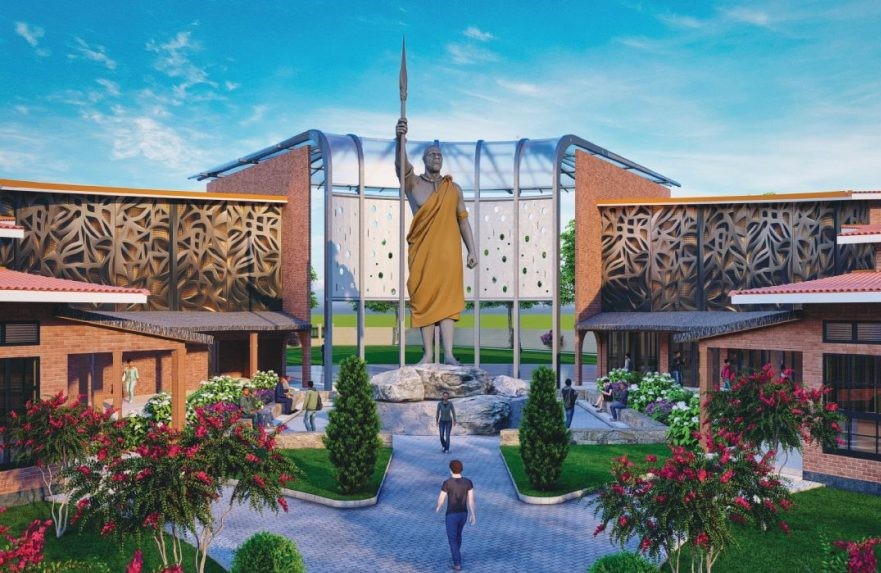Kabalega Cultural Square Project
KCS is a legacy landmark project aimed at immortalising the legacy of Omukama Kabalega, and promoting cultural heritage preservation.

Culture & Heritage Preservation
Kabalega Cultural Square Development
The Kabalega Cultural Square Development is an ambitious project aimed at preserving and promoting the rich cultural heritage of the region, while fostering community engagement and tourism. Named after the iconic King Kabalega, the square will serve as a vibrant hub for cultural exchange, showcasing traditional music, dance, art, and crafts. It will offer a space for local artisans, performers, and cultural enthusiasts to gather, share their heritage, and connect with visitors. The development will also include modern amenities to ensure it caters to both locals and tourists, providing a unique blend of tradition and innovation.
By establishing this cultural center, the Kabalega Foundation hopes to strengthen community pride, stimulate nike zoom vomero 5 economic growth through cultural tourism, and preserve the region’s historical significance for future generations. Together with our partners, Kabalega Foundation works to empower local communities, support cultural initiatives, and foster development and a deeper understanding of Uganda’s rich traditions.
Objectives:
- Preserve Cultural Heritage: To establish a central space that celebrates and preserves the cultural traditions and history of the region, particularly focusing on the legacy of King Kabalega.
- Promote Cultural Exchange: To create a vibrant hub where diverse communities can share their cultural practices, fostering mutual respect and understanding.
- Encourage Tourism: To attract both local and international tourists by showcasing the rich cultural and historical assets of the region, thereby contributing to the local economy.
Specific Goals:
- Establish a Cultural Hub: Develop a fully functional cultural square featuring museums, performance stages, artisan markets, and spaces for workshops and community events.
- Host Cultural Events: Organize annual festivals, cultural exhibitions, and traditional performances that highlight the region’s art, music, and dance.
- Engage Local Communities: Involve local artisans, musicians, and performers in the daily operations of the square, providing them with a platform to display and sell their work.
- Create Sustainable Infrastructure: Develop eco-friendly infrastructure that incorporates green spaces, renewable green camouflage military Patch jacket - breasted blazer By Malene Birger - Brown ‘Abruzzi’ single - SchaferandweinerShops Azerbaijan energy, and sustainable building materials.
Planned Outcomes:
- Cultural Awareness and Preservation: Increased public awareness and respect for the region’s cultural history, traditions, and significance of King Kabalega’s legacy.
- Economic Growth through Tourism: Boost in local tourism, which leads to economic growth, job creation, and opportunities for small businesses such as crafts, food, and tourism services.
- Community Empowerment: Empowerment of local communities through active participation, offering economic opportunities for artisans, performers, and vendors.
- Educational Impact: Creation of educational programs for local schools, visitors, and tourists to learn about cultural preservation, history, and the arts.
Target Audience:
- Local Communities: Local residents, especially artisans, performers, and students who will benefit directly from the activities at the cultural square.
- Tourists: Both domestic and international tourists interested in exploring cultural heritage and history.
- Government & Educational Institutions: Local and national government bodies, as well as educational institutions that can collaborate on educational programs.
- Cultural Enthusiasts: Artists, scholars, and cultural organizations interested in cultural exchange and preservation.
Timeline:
- 2 Years (Planned time to complete development).
Budget:
Total Project Budget: UGX 6,750,000,000 (USD 1,711,440)
Planned Sources of Funding:
- Funding Sources: The project will be funded through a mix of government support, private donations, grants from cultural and tourism organizations, and crowdfunding efforts.
- Partnerships: Collaborations with local artisans, cultural organizations, government bodies, tourism agencies, and environmental groups to ensure the project is inclusive and sustainable.
- Sustainability Focus: The cultural square will incorporate a revenue generation model for self sustenance, environmentally FledermausShops - mens air jordan 4 legacy coach jacket Mid SE Iridescent CK6587 - 100 Release Date Info , air jordan retro x nike jordan why not zer01 black gym redblack new year deals friendly practices such as waste management systems, solar power, and rainwater harvesting to minimize nike sabrina 1 brooklyn fq3381 301 its ecological impact.
